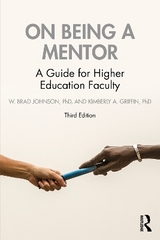
On Being a Mentor
Routledge (Verlag)
978-1-138-89227-9 (ISBN)
- Titel erscheint in neuer Auflage
- Artikel merken
Highlights of the new edition include:
Introduces a new model for conceptualizing mentoring relationships in the context of the various relationships professors typically develop with students and faculty (ch. 2).
Provides guidance for creating a successful mentoring culture and structure within a department or institution (ch. 16).
Now includes questions for reflection and discussion and recommended readings at the end of each chapter for those who wish to delve deeper into the content.
Best Practices sections highlight the key takeaway messages.
The latest research on mentoring in higher education throughout.
Part I introduces mentoring in academia and distinguishes mentoring from other types of relationships. The nuts and bolts of good mentoring from the qualities of those who succeed as mentors to the common behaviors of outstanding mentors are the focus of Part II. Guidance in establishing mentorships with students and faculty, the common phases of mentorship, and the ethical principles governing the mentoring enterprise is also provided. Part III addresses the unique issues and answers to successfully mentoring undergraduates, graduate students, and junior faculty members and considers skills required of faculty who mentor across gender and race. Part IV addresses management of dysfunctional mentorships and the documentation of mentorship outcomes. The book concludes with a chapter designed to encourage academic leaders to make high quality mentorship a salient part of the culture in their institutions.
Ideal for faculty or career development seminars and teaching and learning centers in colleges and universities, this practical primer is appreciated by professors, department chairs, deans, and graduate students in colleges, universities, and professional schools in all academic fields including the social and behavioral sciences, education, natural sciences, humanities, and business, legal, and medical schools.
W. Brad Johnson is professor of psychology at the U.S. Naval Academy and a Faculty Associate at Johns Hopkins University. Dr. Johnson is invited to give mentoring workshops for university faculty around the globe.
Part I: On Mentoring 1. Why Mentoring Matters 2. The Mentoring Relationship Continuum 3. Exemplary Mentoring in Academe: A Glimpse Inside Part II: On Being a Mentor 4. Foundational Mentoring Competencies: Who Mentors Are 5. Functional Mentoring Competencies: What Mentors Do 6. Beginning a Mentoring Relationship 7. The Seasons of Mentorship: Common Relationship Phases 8. The Ethical Mentor: Doing No Harm Part III: On Mentoring Specific Groups 9. Mentoring Undergraduates 10. Mentoring Graduate Students 11. Mentoring Junior Faculty 12. Mentoring and Gender 13. Mentoring Across Race Part IV: Managing Mentorships 14. Diagnosis and Management of Mentorship Dysfunction 15. Assessing Mentoring Outcomes 16. Recommendations for Academic Leaders: What Deans and Department Chairs Can "Do"
| Erscheint lt. Verlag | 11.11.2015 |
|---|---|
| Zusatzinfo | 7 Line drawings, black and white; 1 Halftones, black and white |
| Verlagsort | London |
| Sprache | englisch |
| Maße | 152 x 229 mm |
| Gewicht | 453 g |
| Themenwelt | Geisteswissenschaften ► Psychologie |
| Sozialwissenschaften ► Pädagogik ► Erwachsenenbildung | |
| Sozialwissenschaften ► Soziologie | |
| ISBN-10 | 1-138-89227-0 / 1138892270 |
| ISBN-13 | 978-1-138-89227-9 / 9781138892279 |
| Zustand | Neuware |
| Informationen gemäß Produktsicherheitsverordnung (GPSR) | |
| Haben Sie eine Frage zum Produkt? |
aus dem Bereich



